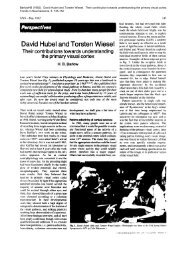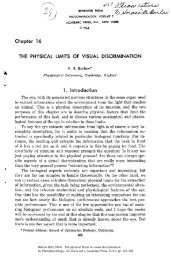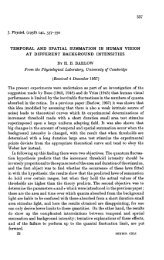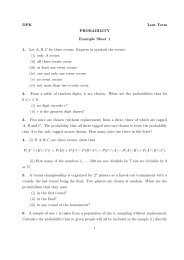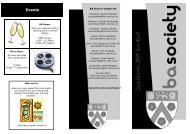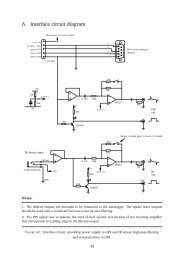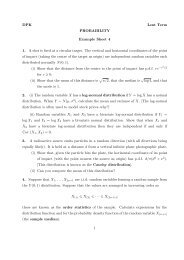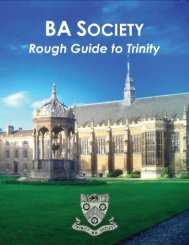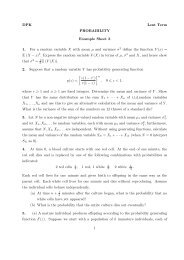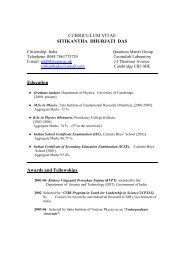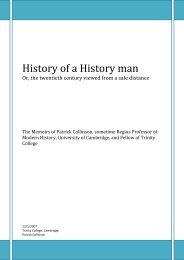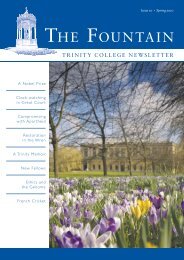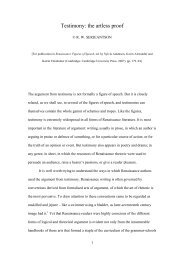Hume's General Rules - Serjeantson
Hume's General Rules - Serjeantson
Hume's General Rules - Serjeantson
Create successful ePaper yourself
Turn your PDF publications into a flip-book with our unique Google optimized e-Paper software.
<strong>Serjeantson</strong>-18<br />
‘rules’ formed a fundamental component of early modern Aristotelian philosophy in<br />
general, and of the disciplines of logic, physics, and metaphysics in particular. It was<br />
of this tradition that Leibniz commented in the Nouveaux essais that, ‘There are<br />
certain philosophical rules--big books crammed with them--which people like to<br />
use’. 61 One such book, the Jena Aristotelian Daniel Stahl’s (1585-1654) Regulae<br />
philosophicae (‘Philosophical rules’, 1657) explains the value of rules precisely as<br />
inhering in their general nature. Stahl began his treatise by explaining that ‘We have<br />
put together these Philosophical rules, which, on account of their generality (propter<br />
generalitatem), are conspicuously valuable in all disciplines’. Hume’s account of rules<br />
retains the Aristotelian emphasis on generality. But he could not endorse a further<br />
aspect of these axiomatic regulae, which held them to be praecognita; that is, selfevident,<br />
and indeed prior to reasoning or experience. 62<br />
It was in their Aristotelian aspect as precognitive maxims that John Locke<br />
launched a devastating attack on general rules in Book IV, chapter 7, of the Essay<br />
Concerning Humane Understanding. In his Free and Impartial Censure of the<br />
Platonick Philosophie (1666), Samuel Parker (who seems to be one of Locke’s targets<br />
in this chapter) had attempted to rehabilitate such maxims by arguing that their basis<br />
was fundamentally empirical: ‘general Axiomes are only the results and abridgements<br />
of a multitude of single Experiments’. 63 Locke, in contrast, equated such rules of<br />
reasoning with Aristotelian metaphysical maxims that the mechanical philosophy had<br />
done so much to explode. Locke’s objection to such maxims was that their self-<br />
61 Leibniz, Nouveaux essais, p. 419. Translation from Leibniz, New Essays, p. 419.<br />
62 Daniel Stahl, Regulae philosophicae (Oxford: J. Webb, 1663), p. 1. On this point see further<br />
Maclean, 'Evidence, logic, the rule and the exception’, who discusses (pp. 235, 238) the senses of<br />
generaliter, and concludes persuasively (p. 256): ‘The laws which [Renaissance doctors and jurists]<br />
invoke under the name of “axiomata,” “praecognita,” “regulae,” “ordo” are different in kind from those<br />
which preoccupy such thinkers of the seventeenth century as Descartes and Newton. If there is a<br />
decisive shift in mental habit which occurred between these figures and the late Renaissance, it is<br />
perhaps to be located here rather than in the slavish and uncritical adherence to Aristotelian doctrines<br />
of which they were accused by their successors.’<br />
63 Samuel Parker, A Free and Impartial Censure of the Platonick Philosophie (Oxford: Richard Davis,<br />
1666), p. 55. See also the discussion by Milton, 'Induction before Hume', p. 64.



